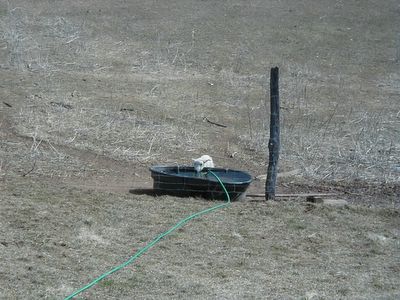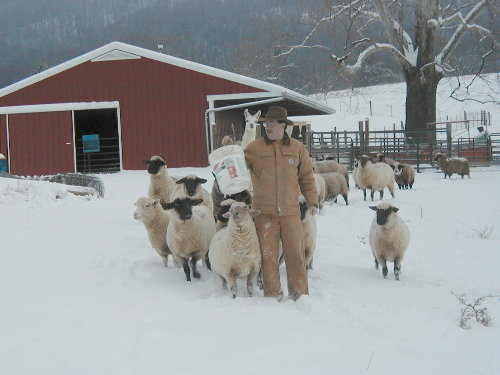Notes From a Hillside Farm
Notes from a Hillside Farm; being Musings and Observations on Life, Letters, and our Most Holy Faith, by a Lawyer, Sheep- farmer, and Communicant of the Orthodox Church
Sunday, March 13, 2005
Today is Forgiveness Sunday in the Orthodox calendar, the last stop before Lent begins tomorrow. I drove into the city this morning to St. Mary's, my "home" parish where I was introduced to Orthodoxy, to join the congregation in asking each other for forgiveness, beginning our repentance with reconciliation. Here is an excerpt from Alexander Schmemann's Great Lent on the meaning of this Sunday:
Lent is the liberation of our enslavement to sin, from the prison of "this world." And the Gospel lesson of this last Sunday (Matt. 6:14-21) sets the conditions for that liberation. The first one is fasting -- the refusal to accept the desires and urges of our fallen nature as normal, the effort to free ourselves from the dictatorship of flesh and matter over the spirit. . . . The second condition is forgiveness-- "If you forgive men their trespasses, your Heavenly Father will also forgive you." The triumph of sin, the main sign of its rule over the world is division, opposition, separation, hatred. Therefore the first break through this fortress of sin is forgiveness: the return to unity, solidarity, love. To forgive is to put between me and my "enemy" the radiant forgiveness of God Himself. To forgive is to reject the hopeless "dead-ends" of human relations and to refer them to Christ. Forgiveness is truly a "breakthrough" of the Kingdom into this sinful and fallen world.
We begin our fast with an act of reconciliation, a return to unity with those around us. The fast itself teaches us another lesson as we struggle. It should be simple enough; eat this, not that. No real sacrifice, just a demand for a little effort and a modicum of attention to the daily routine. Soon enough, I know, I will start looking for excuses, exceptions, exemptions. Worse still, I will simply forget and have that cheeseburger half eaten before I give a second thought to what I am doing, or why. As the Apostle Paul said in his letter to the Romans, "I do not understand my own actions. For I do not do what I want, but I do the very thing I hate." The fast makes me realize that, not only am I divided from those around me, I am divided within myself, walking about in a kind of daydream constructed of appetite and ingrained habit. Again in the words of the Apostle, "Wretched man that I am! Who will deliver me from this body of death?"
So, is Lent simply an annual run into the brick wall of your own failures and finitude, a reminder that one is, in fact, a sinner? No, or, if there is some truth there, it is only a half truth. The final word of Lent is spoken not in Lent itself, but just after midnight as Holy Saturday turns into Easter Sunday. Who will deliver me from this body of death? The answer comes as we sing triumphantly, "Christ is risen from the dead, trampling down death by death, and upon those in the tombs bestowing life." Despite all appearances, there are no "dead-ends" in ourselves, our lives, our relationships. At any moment the Kingdom is poised to break in and our Lenten disciplines teach us to wait with hope, and with great expectations.


